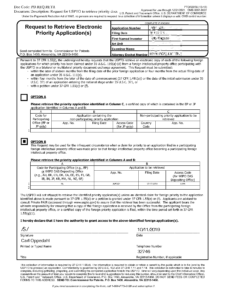 Until now, every Office that had become an Accessing Office for designs had previously been an Accessing Office for patents (except Canada). And until now, every Office that had become a Depositing Office for designs had previously been a Depositing Office for patents (except Canada). Continue reading “Canada joins DAS for patents as Accessing Office”
Until now, every Office that had become an Accessing Office for designs had previously been an Accessing Office for patents (except Canada). And until now, every Office that had become a Depositing Office for designs had previously been a Depositing Office for patents (except Canada). Continue reading “Canada joins DAS for patents as Accessing Office”
November 11 is a holiday at the USPTO
Monday, November 11, 2019 will be a federal holiday in the District of Columbia. This means the USPTO will be closed. This means that any action that would be due at the USPTO on November 11 will be timely if it is done by Tuesday, November 12, 2019.
e-filing at WIPO — back to normal
 For the past week the situation for e-filing at WIPO, for most people in the US, has been that the local time to e-file so as to get a same-day filing date in Switzerland has been different from usual. (The reason for this is that a week ago, people in Switzerland turned their clocks back.) But as of today, people in the US have turned their clocks back. So things are back to normal.
For the past week the situation for e-filing at WIPO, for most people in the US, has been that the local time to e-file so as to get a same-day filing date in Switzerland has been different from usual. (The reason for this is that a week ago, people in Switzerland turned their clocks back.) But as of today, people in the US have turned their clocks back. So things are back to normal.
For example if you are in the Mountain time zone, once again as of today you will be counting toward 4PM local time to get a same-day filing date in Switzerland. (For the past week the answer was 5PM.)
Time zones and ePCT
Yesterday I blogged about the fact that Europe and US do their daylight saving time changes on different weekends: E-filing at WIPO – you get an extra hour. This prompted Ann Bardini of WIPO to write to me to offer a reminder of some of the features of ePCT that help users to keep track of when midnight is coming and when a filer’s last possible filing date is imminent. With her permission I have more or less converted her email message into the following guest blog posting. Continue reading “Time zones and ePCT”
e-filing at WIPO – you get an extra hour
It’s that time of year again. People in the US who sometimes e-file stuff at the International Bureau at WIPO will have memorized exactly what the local time is that works out to being midnight in Switzerland … and for the next week, the answer to this question will be different from the usual answer. Continue reading “e-filing at WIPO – you get an extra hour”
Tomorrow is Mole Day
 I trust that readers of this blog who are chemistry enthusiasts are paying attention to the fact that tomorrow is Mole Day. The observance of Mole Day runs from 6:02 AM tomorrow (10/23 or October 23) to 6:02 PM.
I trust that readers of this blog who are chemistry enthusiasts are paying attention to the fact that tomorrow is Mole Day. The observance of Mole Day runs from 6:02 AM tomorrow (10/23 or October 23) to 6:02 PM.
Have you made special plans for Mole Day? Please post a comment below.
Still another fax bites the dust
 Now comes the news that on January 1, 2020, the Swiss Federal Institute of Intellectual Property will turn off its fax machine. Continue reading “Still another fax bites the dust”
Now comes the news that on January 1, 2020, the Swiss Federal Institute of Intellectual Property will turn off its fax machine. Continue reading “Still another fax bites the dust”
A very poorly designed USPTO form

(Update: A letter got sent on February 22, 2020 to the Commissioner for Patents at the USPTO, asking the USPTO to reformat this form. See blog post.)
Which patent form on the USPTO web site is the most poorly designed? Just now the form at the top of my list of poorly designed forms is Form PTO/SB/38, the Request to Retrieve Priority Applications. Continue reading “A very poorly designed USPTO form”
October 14 will be a holiday at the USPTO
Monday, October 14, 2019 will be a federal holiday in the District of Columbia. This means the USPTO will be closed. This means that any action that would be due at the USPTO on October 14 will be timely if it is done by Tuesday, October 15, 2019.
How the non-DOCX penalty will work for non-English filings?
USPTO published a Notice of Proposed Rulemaking some months ago, proposing to hit the filer with a $400 if the filer files a patent application in a format other than Microsoft Word word processor format. (USPTO says “DOCX” but realistically the only way a filer can get USPTO’s system to work accurately is to generate the word processor file with Microsoft Word, and even then, only with Microsoft Word for Windows, in a very recent version of the software.)
I published two comments (here and here) explaining some of the reasons why I feel the USPTO got it wrong on this. And I joined seventy-two other patent practitioners in signing a comment that explored in quite some detail some of the things that USPTO got wrong on this.
I imagine most of us nowadays have started at least trying to e-file in DOCX, just to try to find out how bad it is so that we can get ready for how bad it will be when USPTO starts charging the $400 penalty. And recently I realized that there is a very interesting fact pattern that I am quite confident that no one at the USPTO thought about at all when it promulgated this Rule — the fact pattern where the initial filing is in a non-English language. Continue reading “How the non-DOCX penalty will work for non-English filings?”
